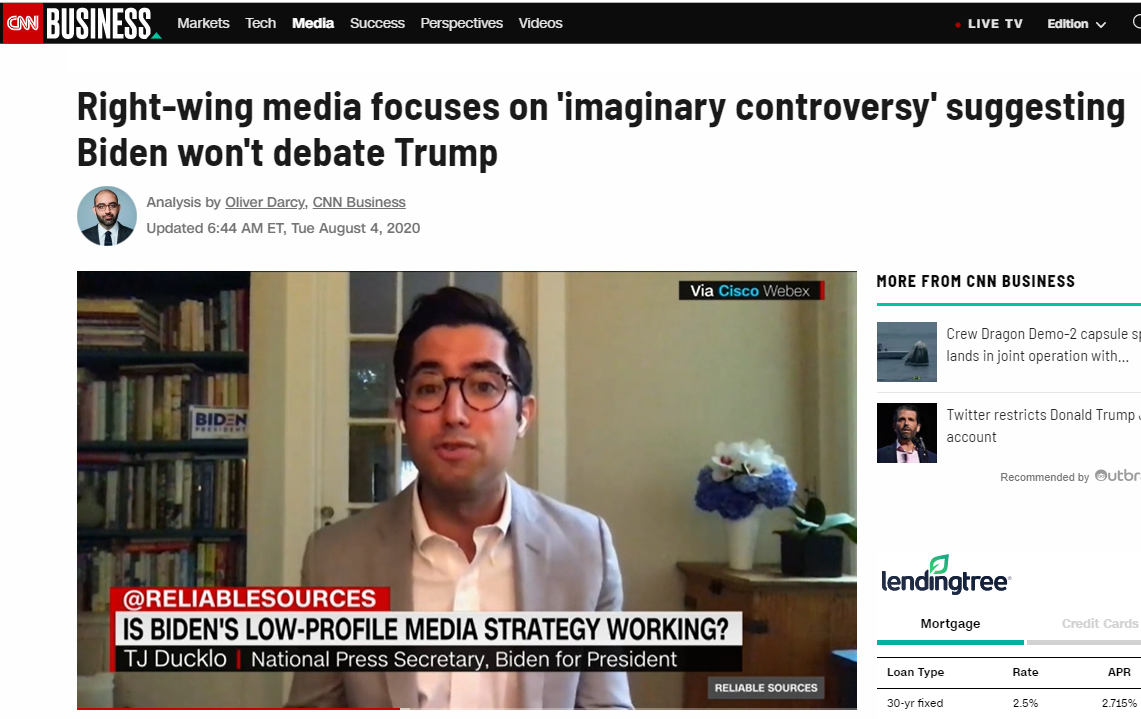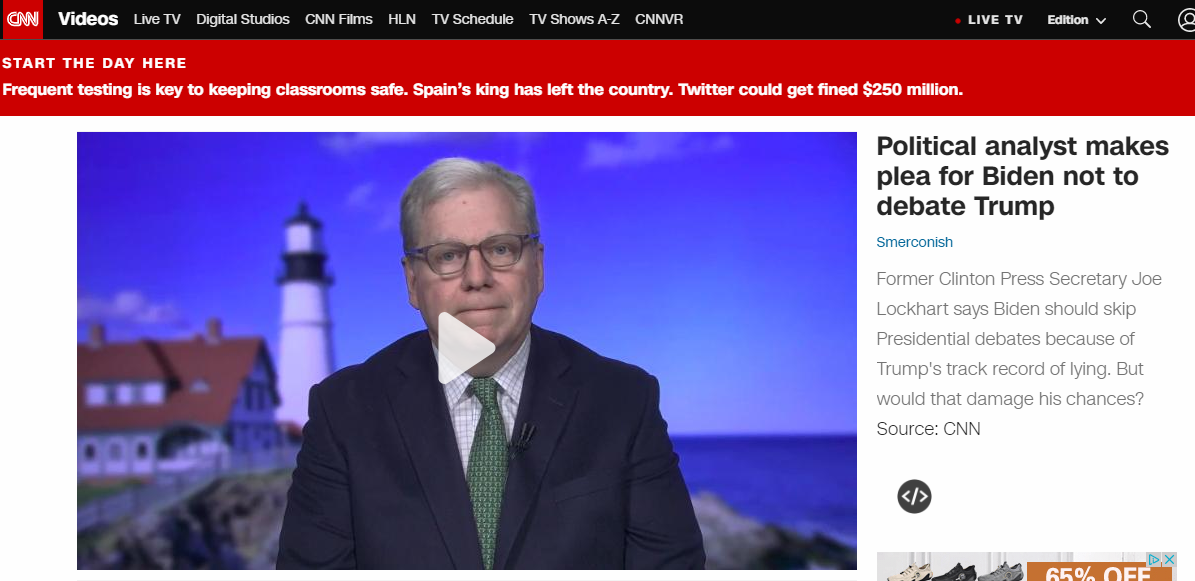Scrap the debates
-
The more cynical might consider this totally not unexpected.
https://www.nytimes.com/2020/08/03/opinion/trump-biden-presidential-debates-2020.html
-
He makes interesting points but the fact is this is pretty much the only time we get to see candidates perform in an adversarial situation, to defend their positions, as thin as that discussion is.
But yeah, if one were to be cynical it might well be expected. This is a trial balloon.
-
@Horace said in Scrap the debates:
paywall
=-=-=-=-=-=-=-=-=-=-=-=-=-=-=-=
Let’s Scrap the Presidential DebatesThey’ve become unrevealing quip contests.
By Elizabeth DrewAug. 3, 2020
Nervous managers of the scheduled 2020 presidential debates are shuffling the logistics and locations to deal with the threat of the coronavirus. But here’s a better idea: Scrap them altogether. And not for health reasons.
The debates have never made sense as a test for presidential leadership. In fact, one could argue that they reward precisely the opposite of what we want in a president. When we were serious about the presidency, we wanted intelligence, thoughtfulness, knowledge, empathy and, to be sure, likability. It should also go without saying, dignity.
Yet the debates play an outsize role in campaigns and weigh more heavily on the verdict than their true value deserves.
Perhaps the most substantive televised debate of all was the first one, between John F. Kennedy and Richard Nixon, which Nixon was considered to have won on substance on the radio, while the cooler and more appealing Kennedy won on television. Since these weren’t true debates, the concept of “winning” one of these odd encounters was always amorphous. (To be sure, many questions by panels of journalists were designed less to stimulate debate than to challenge one of the candidates.)
Over time, the debates came to resemble professional wrestling matches, and more substantive debates were widely panned in the press. Points went to snappy comebacks and one-liners. Witty remarks drew laughs from the audience and got repeated for days and remembered for years.
Some of them have been less than hilarious, but they did the job of dominating reaction to a debate. Whatever substance existed was largely ignored. In 1980, when Ronald Reagan debated the incumbent Jimmy Carter, Carter made a serious point about Reagan’s position on Medicare, and Reagan’s riposte, “There you go again,” a non-answer if ever there was one, brought down the house and that was that.
In the first 1984 debate, Reagan, seeking re-election and at 73, the oldest person to be nominated for the presidency, seemed tired and tended to wander off mentally at times. His lackluster performance caused panic among his staff. Democratic supporters of former Vice President Walter Mondale saw an opening.
But another debate soon followed. Thoroughly prepared, Reagan got off the crack, “I will not make age an issue of this campaign. I am not going to exploit, for political purposes, my opponent’s youth and inexperience.”
President Ronald Reagan during a debate with Walter F. Mondale in October 1984.David Longstreath/Associated Press
The audience roared and Mr. Mondale feigned a laugh, knowing he was cooked. Not even Reagan’s ending of that debate, reminiscing about driving along the Pacific Coast and musing about time capsules, was enough to undermine his political prospects. Reagan’s “joke” aimed at nullifying the age issue dominated the post-debate chatter.But what is the point or relevance of the carefully prepared one-liner? It’s as spontaneous as a can of sardines. It’s usually delivered from a memory chip in the mind, having been fashioned and rehearsed with aides. When is a president called upon to put down an interlocutor, be it a member of Congress or a foreign leader?
This, by the way, isn’t written out of any concern that Donald Trump will prevail over Joe Biden in the debates; Mr. Biden has done just fine in a long string of such contests. The point is that “winning” a debate, however assessed, should be irrelevant, as are the debates themselves.
The better way to pay attention to and choose among the presidential candidates is to follow the long campaign that so many complain about. The reason for such moaning has always been a mystery, because unless the campaign is taking place in your living room, you can simply switch it off.
The key words are “pay attention to,” because over the stretch of 2015-2016 it wasn’t impossible to see the implications of a Trump presidency. Not just the vulgarity but the ignorance and insensitivity and extreme narcissism were apparent more than a year before Election Day.
Moreover, we didn’t need the debates to tell us that Trump had chosen to be the P.T. Barnum of American politics. For him, it was (and still is) all about the show, about distracting the public from reality. It was obvious that Mr. Trump had no real affinity for the working-class people whose votes he was chasing. Nothing in his life suggested that his heart was with struggling workers and farmers. It wasn’t impossible to know that he wasn’t the skilled businessman he professed to be. His bankruptcies and shady business practices and discrimination against Black tenants were no secret.
The debates took us nowhere nearer the realities about arguably the most disastrous president in our history. They became simply another tool in his arsenal.
The party conventions, also vestigial organs of a political system that no longer exists, are close to being done away with, if not for the reasons they should be. There’s no reason not to throw the presidential debates on the trash heap of useless (at best) rituals that are no help in our making such a fateful decision.
Elizabeth Drew, a political journalist who for many years covered Washington for The New Yorker, is the author of “Washington Journal: Reporting Watergate and Richard Nixon’s Downfall.”
-
@George-K said in Scrap the debates:
Quote from the article. She is an OUTSTANDING mind reader!! I am working towards that ability:
Moreover, we didn’t need the debates to tell us that Trump had chosen to be the P.T. Barnum of American politics. For him, it was (and still is) all about the show, about distracting the public from reality. It was obvious that Mr. Trump had no real affinity for the working-class people whose votes he was chasing. Nothing in his life suggested that his heart was with struggling workers and farmers. It wasn’t impossible to know that he wasn’t the skilled businessman he professed to be. His bankruptcies and shady business practices and discrimination against Black tenants were no secret.
The debates took us nowhere nearer the realities about arguably the most disastrous president in our history.I mean, really? This, the NY Times.
-
It wouldn't surprise me to see something like that in their news section soon enough, but to be fair this is an opinion piece.
@jon-nyc said in Scrap the debates:
It wouldn't surprise me to see something like that in their news section soon enough, but to be fair this is an opinion piece.
And it’s not by the editorial board either.
I wonder if they fact-checked it, LOL.
-
It's never been a big issue with me, but I wouldn't miss them. They're so orchestrated and managed to the nth degree, everybody is so unperturbed. It's all theatrics . . . you don't really learn much that is useful.
But there's the ratings, you dig. How much advertising do they attract?
-
This, by the way, isn’t written out of any concern that Donald Trump will prevail over Joe Biden in the debates
I wonder if this is intentionally dishonest of the writer, or if she really has deluded herself into believing it. I also wonder if there's any real difference, human psychology being what it is.
-
If you asked the average American what was the biggest event in our elections don’t you think the number 1 answer would be the debates?
Could you imagine a Democrat president on the ropes and the NYT carrying this op-Ed?
If so isn’t the perspective of the author of this piece fear of the outcome?
-
If you asked the average American what was the biggest event in our elections don’t you think the number 1 answer would be the debates?
Could you imagine a Democrat president on the ropes and the NYT carrying this op-Ed?
If so isn’t the perspective of the author of this piece fear of the outcome?
-
@Loki said in Scrap the debates:
If you asked the average American what was the biggest event in our elections don’t you think the number 1 answer would be the debates?
I'd think it was what happens on Election Night.
-
I would be totally against no debates.
This would be the moral equivalent of not releasing tax returns as far as respecting the norms of the process.
@jon-nyc said in Scrap the debates:
I would be totally against no debates.
This would be the moral equivalent of not releasing tax returns as far as respecting the norms of the process.
Historically speaking that's a pretty recent "norm" particularly in the context of candidates' debates. A quick look shows that releasing taxes began with (cough) Nixon who, in 1974, released records from 1969 through 1972. Ford didn't release his. And since 1977 every president's taxes are audited by IRS.
And, of course, don't forget that the Speaker of the House has refused as well, because "she's not running for President."
-
There's a long of history of master debaters being elected to high office.


